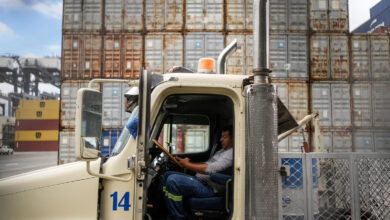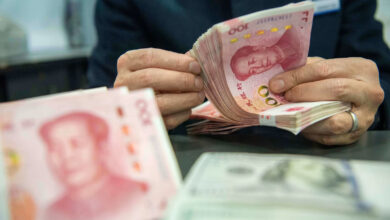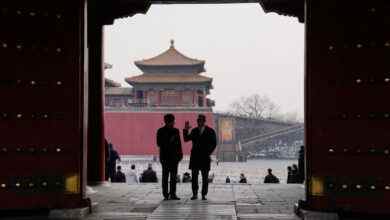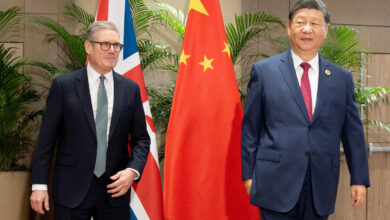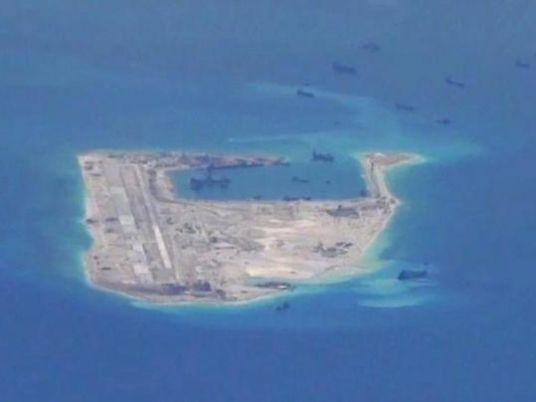
China vowed to take all necessary measures to protect its sovereignty over the South China Sea and said it had the right to set up an air defence zone, after rejecting an international tribunal's ruling denying its claims to the energy-rich waters.
Chinese state media called the Permanent Court of Arbitration in the Hague a "puppet" of external forces, after it ruled that China had breached the Philippines' sovereign rights by endangering its ships and fishing and oil projects.
Beijing has repeatedly blamed the United States for stirring up trouble in the South China Sea, where its territorial claims overlap in parts with Vietnam, the Philippines, Malaysia, Brunei and Taiwan.
"China will take all necessary measures to protect its territorial sovereignty and maritime rights and interests," the ruling Communist Party's official People's Daily said in a front page commentary on Wednesday.
The case, overseeing a region that is home to one of the world's busiest trade routes, has been seen as a test of China's rising power and its economic and strategic rivalry with the United States.
Beijing called the Philippines' claims of sovereignty in the South China Sea "baseless" and an "act of bad faith". In a government white paper published on Wednesday, China also said its fishing boats had been harassed and attacked by the Philippines around the disputed Spratly Islands.
"On whether China will set up an air defence zone over the South China Sea, what we have to make clear first is that China has the right to… But whether we need one in the South China Sea depends on the level of threats we face," Vice Foreign Minister Liu Zhenmin told reporters in Beijing, adding that China hoped to return to bilateral talks with Manila.
"We hope that other countries don't use this opportunity to threaten China, and hope that other countries can work hard with China, meet us halfway, and maintain the South China Sea's peace and stability and not turn the South China Sea in a source of war."
U.S. officials have previously said they feared China may respond to the ruling by declaring an air defence identification zone in the South China Sea, as it did in the East China Sea in 2013, or by stepping up its building and fortification of artificial islands.
China's Liu also took aim at the judges on the tribunal, saying that as not one of them was Asian they could not possibly understand the issue and it was unfair of them to try.
European Council President Donald Tusk, in Beijing for a China-EU summit, said he hoped the ruling would be a positive moment in resolving outstanding issues in the disputed waters.
Complicated, unclear
The Philippines reacted cautiously to the ruling late on Tuesday, calling for "restraint and sobriety", but the mood at President Rodrigo Duterte's cabinet meeting on Wednesday was "upbeat", presidential spokesperson Ernesto Abella said.
Philippines Defence Secretary Delfin Lorenzana said he had spoken to U.S. counterpart Ash Carter ahead of the ruling who told him China had assured the United States it would exercise restraint, and the U.S. made the same assurance. Carter had sought and been given the same assurance from the Philippines, Lorenzana added.
"The ruling can serve as a foundation on which we can start the process of negotiations which hopefully will eventually lead to the peaceful settlement of the maritime dispute in the South China Sea," Charles Jose, a spokesman for the Philippines' Department of Foreign Affairs, said.
One of the lawyers who argued the Philippines' case said how and when the country would enforce the tribunal's ruling was complicated.
"There's no timeline for this game. It might have an extended period of gestation," said Florin Ternal Hilbay, a former solicitor general. "I would assume our diplomats have read the decision and understand the complexities and consequences of enforcing the decision."
Global intelligence firm Stratfor said fishermen from China or the Philippines were the greatest potential disruptors in the region, beyond the easy control of law enforcement.
"The greatest struggle for both countries will be to rein them in, preferably before they get to sea, lest they disrupt the delicate peace," Stratfor said in a note.
In moves likely to antagonize Beijing, the coastguards of Japan and the Philippines took part in simulated rescue and medical response exercises off Manila Bay on Wednesday, part of what the two countries have called efforts to improve maritime security and combat crime and piracy.
Japan and China are involved in a separate territorial dispute in the East China Sea and Beijing has warned Tokyo against meddling in the South China Sea dispute.
Pivot presssure
Beijing's ambassador to the United States earlier blamed the rise in tension in the region on the United States' "pivot" towards Asia in the past few years. Cui Tiankai said the arbitration case "will probably open the door of abusing arbitration procedures.
"It will certainly undermine and weaken the motivation of states to engage in negotiations and consultations for solving their disputes," Cui said at a forum of the Center for Strategic and International Studies (CSIS) in Washington. "It will certainly intensify conflict and even confrontation."
South Korea on Wednesday announced the planned location of a U.S. THAAD anti-missile defence unit against North Korea's missile and nuclear threats, a system that has angered China and prompted a North Korean warning of retaliation.
President Barack Obama's top Asia policy adviser, Daniel Kritenbrink, said the United States had no interest in stirring tensions in the South China Sea as a pretext for involvement in the region.
"We have an enduring interest in seeing territorial and maritime disputes in the Asia Pacific, including in the South China Sea, resolved peacefully, without coercion and in a manner that is consistent with international law," Kritenbrink said at the same forum.
Taiwan President Tsai Ing-wen boarded a navy frigate in southern Taiwan ahead of its departure for the South China Sea early on Wednesday, a regular patrol pushed forward due to the Hague decision, which Taipei rejected.
"This patrol mission is to show the determination of the Taiwan people to defend our national interest," Tsai said from the warship.
China considers self-ruled Taiwan a breakaway province to be united with the mainland eventually, and by force if necessary.

